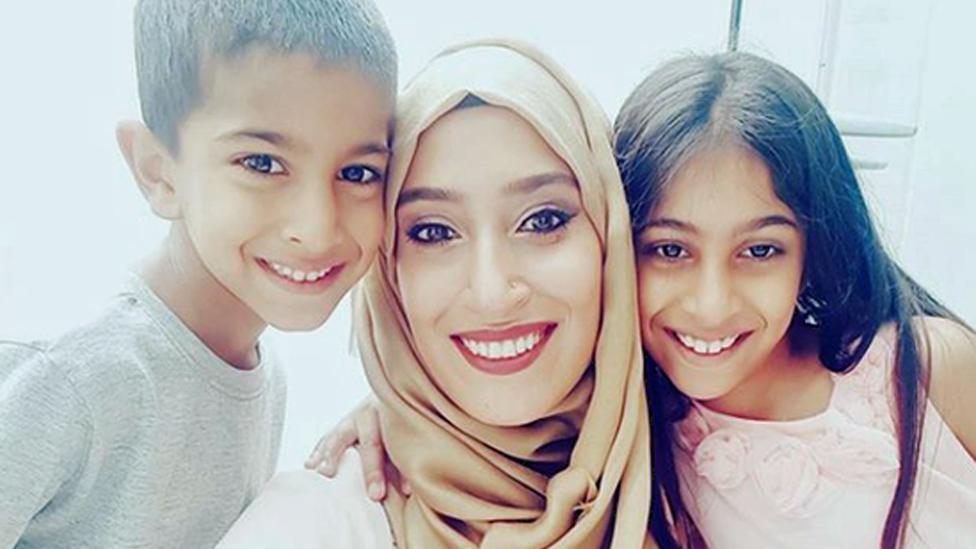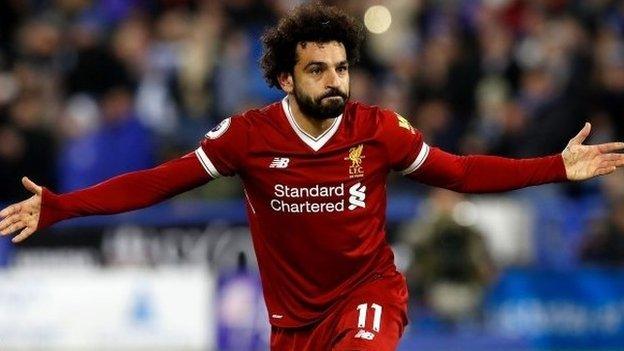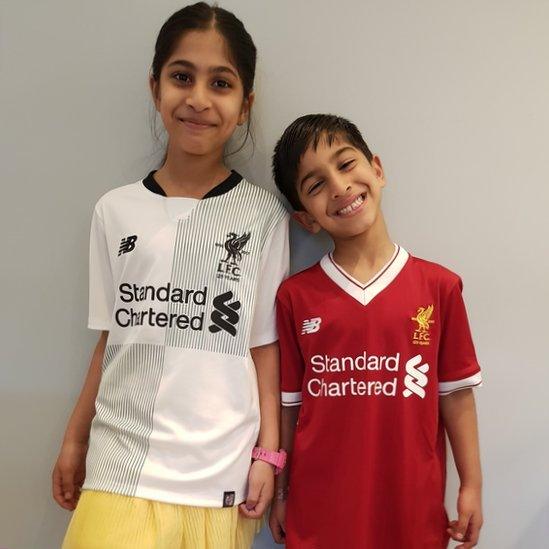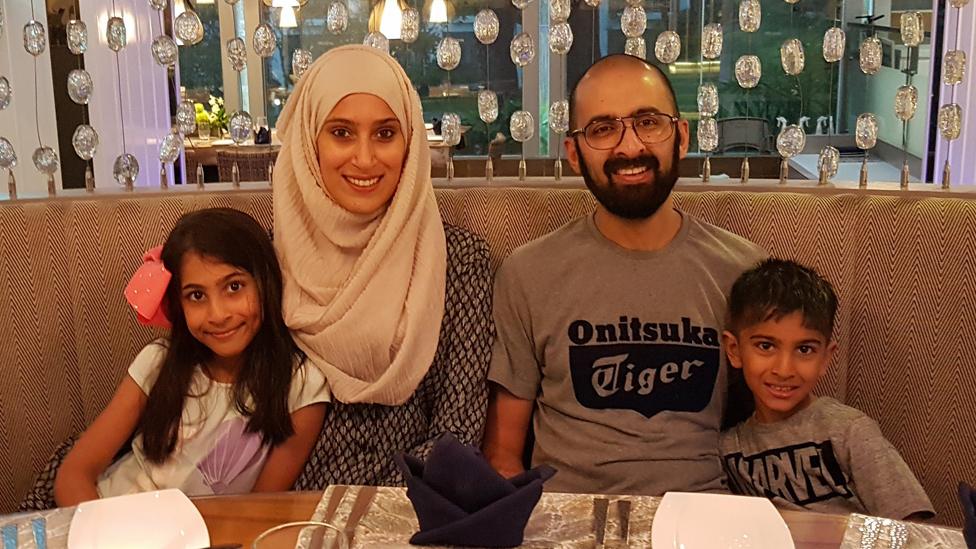100 Women: 'Mo Salah is so important to Muslim children like mine'
- Published

"Mohamed Salah! Go Mo, go!"
The shouts echo around my house as Mohamed Salah scores a sublime opening goal against Roma in the UEFA Champions League semi-final on Tuesday night.
My children, Hanaa, aged eight, and Muhammad, six, beam from ear to ear as we all watch Salah lay face down on the ground, in his trademark goal celebration.
The rise of Liverpool's Egyptian King hasn't gone unnoticed in homes like mine across the country, if not the world.
At the top of his game, Mohamed Salah is uniting communities.
He will pray on the pitch, he will sport his beard with pride and he will play some of the best football you have seen this year.
Do you have any idea how powerful that is to children like mine? He's a role model of our time.
I was born and brought up in east London, England to parents that emigrated here from Yemen and Burma.
Unlike many people my age, I never struggled with the notion of belonging to this country.
However, I am more than aware that in today's climate children from faith and minority backgrounds don't feel the same.
They are exposed to a news agenda that makes them apprehensive about displaying their Islamic heritage.
So it's not surprising when a player like Salah comes along it sparks pride in their hearts.

Mo Salah is the first Egyptian footballer to be named PFA player of the year in the Premier League
My daughter Hanaa watches in awe when Salah raises his hands to the heavens and prays after scoring a goal.
"Mamma, we do that too!" she says.
As with Islamic tradition, many men of the faith have beards. Salah is no different.
So when I catch my six-year-old son standing in front of a mirror trying to pick at tiny baby hairs on his chin and proclaim he too has a beard now just like Salah, my heart soars.
He is arguably the best player in the world right now.
Mohamed Salah is bringing communities together and I for one am relishing it.
Banners depicting him as a Pharoah are held aloft around Anfield.
Songs and chants about mosques and Muslims ring out around stands up and down the country by Liverpool fans who have taken him to their heart. They're full of love and admiration, and Muslims around the world are excited to see it.
In his home country of Egypt, Salah is King.
The jewel in the crown of his national team, his status was cemented when he scored the winning penalty that saw his side through to this summer's World Cup finals in Russia.
Whether he plays for Liverpool or Egypt, for 90 or so minutes he unites a fractured nation and political rivalries are set aside as cafes and homes across Egypt cheer on this mega star.
As a hijab-wearing woman, it is fantastic watching women in headscarves of Liverpool red or the Egyptian flag celebrate alongside Salah's male fans.
And that's why for families like mine, it's more than just a game of football.


What is 100 Women?
BBC 100 Women names 100 influential and inspirational women around the world every year. We create documentaries, features and interviews about their lives, giving more space for stories that put women at the centre.
Follow BBC 100 Women on Instagram, external and Facebook , externaland join the conversation.

Hanaa, aged eight and Muhammad, six are huge Mo Salah fans
A few weeks ago, Hanaa came home from school visibly distressed. There had been talk amongst her group of friends of a campaign to attack Muslims on the 3 April. She was scared and upset.
We spent the next few days explaining that it was a tiny minority of people who didn't understand Islam and Muslims, and the majority of people in this country didn't feel like that at all.
Unfortunately when 3 April came around, she didn't want to go out - she was still too frightened. As parents, it broke our hearts.
How do you explain to young children that there isn't anything to be afraid of, when the reality is, we think about these risks almost daily?
But Mohamed Salah is changing the perception of Muslims, and it's wonderful to see. For the first time in a long time, Muslims aren't the bogeymen.
My Liverpool-supporting friends who aren't Muslim echo the sentiment.
They tell me his status and character is important to celebrate because it challenges the views of the narrow-minded.
I don't profess to be an expert on football tactics or the history of the game.
All I know is that Mohamed Salah has done more for interfaith relations in his short sweet time at Liverpool than any campaign I can remember.
He is unapologetically Muslim. That's how I like to think of him.

Who is Mo Salah?
Full name: Mohamed Salah Ghal
Born: 15/06/1992 - El Gharbia, Egypt
Club: Liverpool FC - bought from AS Roma for £34 million in June 2017
Position: Attacking Midfielder
National Team: Egypt
First Egyptian footballer to be named the Professional Footballers' Association (PFA) Player of the Year in the EPL

In an interview earlier this week, Liverpool Manager Jurgen Klopp talked about how Salah, and the other Muslim players, Sadio Mane and Emre Can, prepare for a game by performing the Islamic ritual of ablution.
Klopp said the rest of the team wait for them and respect the time they need to do that.
It's hard to sum up how important that is to hear for me and my children.
We perform ablutions before we pray our five daily prayers - it's a form of purifying the body and then standing before God.

Rabiya Limbada with her husband Imran and children Hanaa and Muhammad
For such a small act to be talked about openly and respected by a wider community sends out a powerful message to my children and many like them all over the world.
In Islam we talk a lot about respect and hard work.
It's the backbone of our parenting, and bringing up our children to be well-rounded individuals.
So it's no surprise that Salah's clean sheet as a player is often used by my husband as an example of honest hard work.
Salah's brief spell at Chelsea is also a tale of dedication paying off - he kept trying and he got better.
Hanaa, Muhammad and millions of children like them can look to that for inspiration.
We have a glorious summer ahead of us watching and praying for this young man as he heads for the heights of super-stardom.
Rabiya Limbada is on Twitter @Rabiya , external